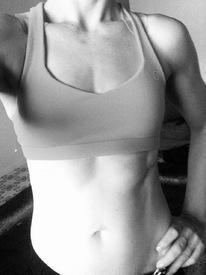Sodium Intake
Options

8BoBradley8
Posts: 1 Member
Hello all,
I am pretty disciplined with my diet, fairly active on MFP and in the gym, and have a decent understanding of how to eat healthy. One thing I struggle with is sodium intake. I find that on my good days I can hover around 2300 mg sodium, and on my not-so-good days I am around 3500 mg of sodium. I have not ever paid too much attention to my sodium intake, so I do not know what kind of affect it has on my weight/body fat.
So I have a few questions. What is your average sodium intake? I read that the average is around 3300 mg (which I find hard to believe) and that healthy sodium intake is around 2300 mg. What affect does sodium have on your body? And what kind of foods are you finding that have such low sodium?
I realize we all have different bodies and will be affected by things differently, but I cannot see sodium intake having a vastly different affect on us. Also, I am more worried about its affects on my weight/body fat than my general health**. So, I would like to hear some answers from people that might have a better understanding than I do.
Mainly, I am finding it difficult to find foods with low sodium, and I do not know if I should worry about it too much if my goal is to drop my body fat percentage.
I appreciate any instructive comments.
**I am not saying that I do not care about my general health, I just am not too worried about it right now, as I am quite healthy. My main goal for the upcoming months is shaving a few more pounds and fat percentiles.
I am pretty disciplined with my diet, fairly active on MFP and in the gym, and have a decent understanding of how to eat healthy. One thing I struggle with is sodium intake. I find that on my good days I can hover around 2300 mg sodium, and on my not-so-good days I am around 3500 mg of sodium. I have not ever paid too much attention to my sodium intake, so I do not know what kind of affect it has on my weight/body fat.
So I have a few questions. What is your average sodium intake? I read that the average is around 3300 mg (which I find hard to believe) and that healthy sodium intake is around 2300 mg. What affect does sodium have on your body? And what kind of foods are you finding that have such low sodium?
I realize we all have different bodies and will be affected by things differently, but I cannot see sodium intake having a vastly different affect on us. Also, I am more worried about its affects on my weight/body fat than my general health**. So, I would like to hear some answers from people that might have a better understanding than I do.
Mainly, I am finding it difficult to find foods with low sodium, and I do not know if I should worry about it too much if my goal is to drop my body fat percentage.
I appreciate any instructive comments.
**I am not saying that I do not care about my general health, I just am not too worried about it right now, as I am quite healthy. My main goal for the upcoming months is shaving a few more pounds and fat percentiles.
0
Replies
-
From what I've been seeing, the salt thing (ok, Sodium, but there are some chlorides in there too) is an area of a lot of discussion/debate and mis-used data (go figure).
I ran into this article not too long ago (contains links to study support) that may provide some insight http://authoritynutrition.com/how-much-sodium-per-day/
If you're asking for general thoughts, to me it seems that our initial "low salt = good" approach was a bit of a knee-jerk reaction for the general population, BUT there are places where a low-sodium lifestyle may be beneficial. Caveat here is that there are several situations were suppression of salt may increase mortality and/or raise other complications. Not one single answer, but an interesting topic nonetheless.
Where is anyone/everyone else on the salt thing? Personally, I've substituted potassium chloride into a few home-cooked items and live with the salt in the rest of my foods. My sodium number are what I'd consider as typical (when normalized to calories) somewhere in the 2200mg/day range without working to actively manage it (beyond what little I stuff that I do with potassium).0 -
Looking at my diary for the last week I'm under 2300 mg most days. But I cook from scratch most days. I know if I have take out or restaurant food my sodium is high and I will see water retention gains on the scale. It's easy to keep sodium lower if you prepare your own food.0
-
Speaking from personal experience, I have to watch my sodium intake for my blood pressure. A few years back I was borderline hypertensive, about to be placed on meds, when the doc asked me to cut back on sodium for a month first. I did, and my blood pressure dropped like a rock to perfectly normal range.
I don't have a specific number I aim for, rather just watch salt addition during cooking. I used to add salt during cooking and again at the dinner table; now I only add at the table. If you add too early the taste can disappear (though the sodium remains), necessitating adding extra salt at the table. I also pay attention to frozen meals which are huge salt-users; I don't necessarily avoid them entirely, but not more than once a week.0 -
I eat a lot of packaged/processed foods, deli meat, pretzels, etc. Avg sodium is 4-5g. Annual bloodwork has been fine since I lost 40lbs.0
-
Speaking from personal experience, I have to watch my sodium intake for my blood pressure. A few years back I was borderline hypertensive, about to be placed on meds, when the doc asked me to cut back on sodium for a month first. I did, and my blood pressure dropped like a rock to perfectly normal range.
I don't have a specific number I aim for, rather just watch salt addition during cooking. I used to add salt during cooking and again at the dinner table; now I only add at the table. If you add too early the taste can disappear (though the sodium remains), necessitating adding extra salt at the table. I also pay attention to frozen meals which are huge salt-users; I don't necessarily avoid them entirely, but not more than once a week.
What would you say your sodium intake level was to drop your BP? Mine is also sometimes borderline, although it seems to be reactive. (If I am chilling at home it will be normal, but just about anything seems to make it go up).
I find it very difficult to keep my sodium below 2000. Most days mine is 2200-2400, sometimes higher. I cook at home a good bit, but even that is difficult. For instance my homemade waffles have nearly 400 mg, because of the baking powder and baking soda. And you pretty much have to have that! And tomorrow I am roasting a pork tenderloin, but almost any sauce I use for seasoning is high in sodium.
And of course, the higher your calorie intake, the more sodium! So if I am cutting, it is usually lower.
As a "woman of a certain age" my body reacts strongly to sodium now, with lots of water retention. (It wasn't like this five years ago!!). So between that and the blood pressure, I really need to figure out how to reduce sodium.
0 -
I'm probably a bad example for you if you need to be sub-2k, since my sodium flies all across the board from 1200 to 3k+ since the start of the year. No idea what it used to be before I started trying to reduce, but had to be really bad.0
-
My sodium intake ranges from 1300 - 5000+ I just looked at this in my diary settings as it is not a nutrient I pay any attention to.
I'm celiac so I can hardly eat any processed foods and I rarely eat foods like crisps, crackers, pretzels etc. My large numbers come in when I eat Asian foods (which I make a lot) and use soy sauce. I probably use soy sauce every other day.
Anyway - my BP is 100/60 and last year when I was unwell, it was found that I had too little sodium in my blood and my Doctor rang me to tell me to eat salted crisps! This came about because it was really hot and I was drinking heaps of water and flushing it out of my system.
My weight is maintained (not trying to lose) at 56kg, this year I have dropped body fat from 21% to around 18.5% (remember I'm a girl!) and gained lean muscle (determined by DEXA scans). I have increased my lifts also.
So, seeing as too much sodium doesn't seem to be having a negative impact on my health, pretty sure I'll continue to ignore it. I would probably advise you to do similar if you are healthy like you state - sodium is probably not making much difference at all. I don't even track it - I think getting enough calcium is more important (I'm at risk of reduced bone strength with being celiac) so I swap my diary settings to track that instead0 -
AFAIK sodium doesn't affect weight/body fat unless you don't have enough, pass out, and can't complete your workout.
The general current consensus is that high levels of sodium do not cause hypertension, but if you are already hypertensive then lowering sodium can also lower your blood pressure as Mr. nossmf demonstrated.
My logged sodium ranges from 1500-3000 on most days, but I don't log salt in my recipes or at the table.0 -
I personally at this moment don't know my accurate sodium number but I can tell you my body is extremely sensitive to sodium. I recently came across a website when I wanted to make a low sodium soup. Processed soup is the worst for me.
Take a look at www.drgourmet.com and go under special needs, low sodium recipes. I have found the several recipes I tried last week were very tasty. Good luck0 -
My BP runs low so my cardiologist told me I need more sodium. I upped it some more once I started following a ketogenic diet. I aim for 3000-4000/day, though I don't always get there.0








